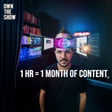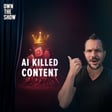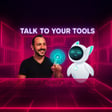
Navigating AI Adoption: From Misconceptions to Technical Challenges w/ Harrison Painter
In this episode of AI-Driven Marketer, Dan Sanchez interviews Harrison Painter, who shares his compelling journey from real estate and marketing to embracing AI as a transformative tool. They delve into the broader implications of AI across various industries, the entrepreneurial insights gleaned from overcoming personal and professional challenges, and practical strategies for non-technical individuals to excel in AI roles. Harrison and Dan highlight foundational tools like ChatGPT and Midjourney, discuss the evolving roles of chief AI officers, and emphasize the importance of emotional intelligence and creativity in leveraging AI effectively. Tune in to discover how AI can revolutionize your approach to business and marketing.
Resources Mentioned:
- ChatGPT: https://openai.com/chatgpt
- Google Gemini: https://gemini.google.com/app
- Midjourney: https://www.midjourney.com
- DALL-E: https://openai.com/dall-e
- Headliner: https://www.headliner.app
- AI fusion workshop conference: https://www.indwes.edu/news/2024/05/ai-fusion-conference-2024-harnessing-ai-for-innovation-across-education-non-profit-and-business
Timestamps:
05:30 Startup demands time, AI tools provided balance.
06:38 AI success relies less on technical skills.
10:40 Tech exhaustion from rapid technology changes and adoption.
15:22 Avoid mistakes, research thoroughly, and improve credibility.
17:58 Developing multiple chatbots to enhance factual debate.
20:37 Small businesses can create synthetic content using Oodio.
25:37 Finding the best, cost-effective solutions is essential.
27:01 Platform with multiple chat agents, time saver.
30:43 Headliner program quickly creates vertical videos from podcasts.
36:02 Value emotional intelligence over technical assessments, questioning.
39:21 New tech can be instantly useful or gimmicky.
42:42 Indiana Wesleyan developing world-class AI training platform.
43:56 Testimonials about AI tech, impactful on non-technical.



![What’s Your Authority Score? [The 5-Factor Test] image](https://media.zencastr.com/cdn-cgi/image/width=112,quality=85/image-files/630c9f06819f8b3dba5fa460/cfbaccba-f587-45de-a41f-e2c99c15e2a5.png)
![The Audience Growth Engine [Full Framework] image](https://media.zencastr.com/cdn-cgi/image/width=112,quality=85/image-files/630c9f06819f8b3dba5fa460/46b84fd1-e856-4687-9aee-6b4a7e0bc7ff.png)



![The "Dream 100" Execution Plan [Google Sheet System] image](https://media.zencastr.com/cdn-cgi/image/width=112,quality=85/image-files/630c9f06819f8b3dba5fa460/fcd89374-76a4-4e58-a2e3-2bb7ddda4364.png)










